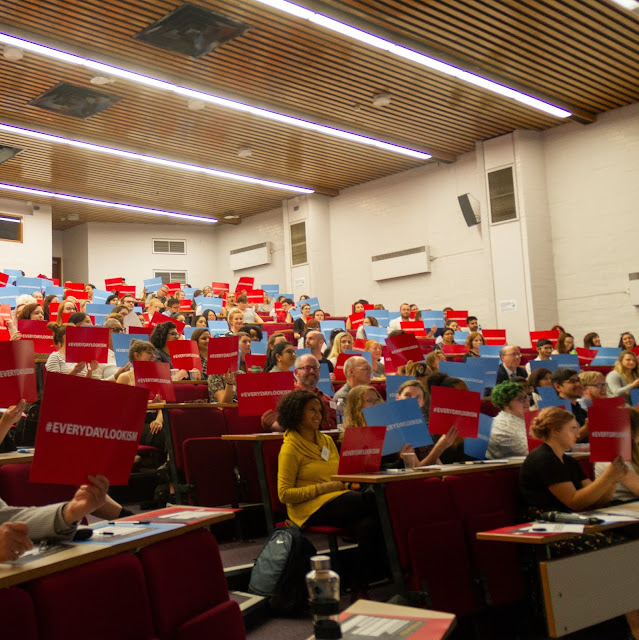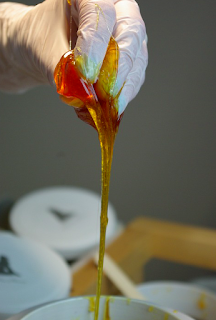Body Negativity: What’s wrong with Body Positivity?
Body
positive campaigns have their hearts in the right place. Their messages are
good and – you guessed it – positive:
Be
resilient. Be confident. Love your body. You are beautiful. All bodies are beautiful.
These
campaigns work for some. Some respond well and do feel more confident. If they work
for you, go for it, fantastic and I’m all for it. I am not suggesting we
shouldn’t teach resilience, we should. But we should not see it as the answer, we should recognise it is
limited. Resilience can be counter-productive. If resilience is something you should do then you feel bad if you can’t
quite manage it. What if you are not body confident, what if you don’t feel
positive about your body?
It
is hard to be resilient in the face
of a dominant and powerful beauty ideal. In a visual and virtual culture, our
bodies are ourselves. Feeling ashamed of our bodies really is being ashamed of
our selves. If we are feeling shame, telling us we shouldn’t feel like we do can
make it worse. It can make us more guilty.
If
you already feel bad because you feel you don’t make the appearance grade, then
being told you shouldn’t feel bad and
you should be confident can make it
worse. You feel ashamed of your body – your self – and more ashamed because you
have the wrong attitude. This is silencing. You have to hide the pain and shame
you feel and pretend to be positive. It’s bad enough feeling unhappy with some
aspect of our bodies, without having to lie about feeling bad.
For
body positive campaigns to really be positive we need to be sure they don’t
just put another demand on top of the already strong demands to look a certain
way. We also need to be sure that they really are celebrating all bodies. There
is a risk that while body positive campaigns often claim to celebrate all
bodies, in fact they only celebrate some. Often they only challenge one feature
of the beauty ideal. If they do this, then they are not really challenging the
beauty ideal – though they think they are – but further embedding it.
There
are four features of the beauty ideal – as I define them in Perfect Me – thinness in some form (and
often with curves), smoothness, firmness and youth. Very often body positivity
campaigns only challenge one of these features at a time.
Remember the Januhairy campaign? This was a campaign started by students at Exeter University. It challenged women to grow their body hair for the month of January. It aimed to convince women to 'love and accept' their body hair while raising money for charity. It received a ton of press, and took off around the world.
This campaign was very likely liberating for those engaged. It also made an important point – that the hairless ideal is neither normal nor natural. But was it really celebrating all bodies? Did it really help all women to ‘love and accept’ their body hair? If you google the campaign, the newsworthy students were beautiful and conforming apart from their underarm hair.
Remember the Januhairy campaign? This was a campaign started by students at Exeter University. It challenged women to grow their body hair for the month of January. It aimed to convince women to 'love and accept' their body hair while raising money for charity. It received a ton of press, and took off around the world.
This campaign was very likely liberating for those engaged. It also made an important point – that the hairless ideal is neither normal nor natural. But was it really celebrating all bodies? Did it really help all women to ‘love and accept’ their body hair? If you google the campaign, the newsworthy students were beautiful and conforming apart from their underarm hair.
Only
the smooth feature of the beauty ideal is challenged. The Januhairy girls are thin,
firm and young. While the intention is good, the image the campaign promotes conforms
to nearly all of the features of the beauty ideal. For more about what I
thought of the Januhairy campaign see: https://www.psychologytoday.com/intl/blog/perfect-me/201901/januhairy-liberation-within-limits
Similarly
fat acceptance campaigns often conform to all but the thin feature of the
ideal. Apart from being plus size, the bodies are firm, smooth, and young. In
fact they are perfect examples of the thin with curves ideal: large buttocks
and breasts and thin waists. Think Paloma Elsesser, Ashley Graham and Felicity Hayward. Or the most
controversial, Tess Holliday, who graced the cover of Cosmopolitan in October
2018. All of these women are firm, young and smooth, and in very many ways
highly conforming: with beautiful features, made up faces and provocative
poses. These campaigns promote and support the dominant beauty ideal much more
than they think they do.
What
if you are old and hairy and fat? Should you still have body confidence?
Is your body lovable too? Is this what these campaigns really say in their
imagery? I don’t think it is. Even if it were and these campaigns really did
celebrate all bodies would it work? If you loved your body more would people
stop judging you on appearance, would the negative comments stop? Being
confident is not enough to change how people respond when we don’t fit the
ideal. Real change is not about how individuals feel, but about how society
treats bodies.
Telling
girls that appearance doesn’t matter isn’t good enough – they know it does.
Telling girls they should have more confidence, they should be resilient, puts
the pressure all on them. It requires that they as individuals stand up to the
beauty myth. It makes it their fault if they don’t have confidence. This isn’t
fair. It’s too much to ask.
We
cannot and should not expect individuals on their own to challenge and resist
the overwhelming dominance of the beauty ideal. More is needed than telling
girls that ‘it’s what’s on the inside that counts’. They know this isn’t true.
More is needed than telling them if they have the right attitude, are body
confident, and love their bodies it will come good. They know it won’t.
So
what can we do? One thing we can do is take it seriously, recognise that our
bodies are ourselves in a visual and virtual culture, and we struggle with the
increasing demands of beauty. If we take the demands seriously, it is easy to
see why body shaming is serious. When you shame bodies you shame people. Body-shaming
– whether fat shaming, a nasty comment about hair colour or a body part – can
make you ashamed, can stay with you and make you insecure.
Body shaming is not OK, we should not do it, and we should call it out when we do. With our #everydaylookism campaign, we have been highlighting just how damaging lookism is, by sharing our body shaming - lookist - stories.
If
you would like to join the campaign and share your story, upload anonymously at
bit.ly/everydaylookism
Heather Widdows is
Professor in the Department of Philosophy at the University of Birmingham, and
author of Perfect Me: Beauty as an
Ethical Ideal.











Great posting. Consult a trained doctor for further information on how to take care of your skin and hair, click for more Skin Pigmentation Treatment in East Delhi
ReplyDelete